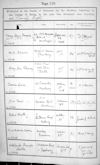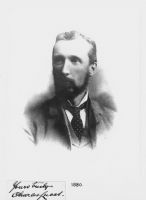CHARLES LUCAS
DEATH OF ALDERMAN CHARLES LUCAS
FIFTY YEARS OF PUBLIC LIFE
WITHIN A MONTH OF CIVIC JUBILEE
“Father” of the Corporation
58 years' Legal Practice
The death of Alderman Charles Lucas removes a prominent personality in the public life of Newbury during the last half-century. He had been in failing health for some time, and latterly had not been able to attend the meetings of the Corporation, although he showed wonderful vitality and had several remarkable rallies, when he insisted on going to his office and carrying on his legal practice, in which he had been assisted in later years by a partner, Mr. Angus Marshall. For a week past he had been lying in a most critical condition, and the end came early on Tuesday evening. He was 81 years of age last April, and it was a pathetic circumstance that had he lived another month he would have completed fifty years of civic service. The Corporation last November passed a resolution of congratulation on the fact that was entering upon his year of jubilee, and expressing the hope that he would live to celebrate it. This, alas, was not to be.
The Son of a Public Man
Charles Lucas was the eldest son of James Henry Lucas, the son of a Malmesbury farmer, who came to Newbury at the age of eighteen, as a clothier's assistant, and eventually established himself in business in Bartholomew-street. The father entered the Council in 1856, was elected Mayor in 1863, and an alderman in 1876 on the extension of the boundaries of the borough, and at the same time his son, Charles, was elected a Councillor. The father died in 1899, in his eightieth year, after forty years of public service. These were stirring and stormy times in municipal history, when political and sectarian warfare raged, at times with great virulence, and a study of the election literature of the period, commonly designated as “squibs,” makes present-day people wonder how the law of libel was evaded. James Lucas was always a fighter and took his share in the output of controversial documents. Thus his son, Charles, was reared in an atmosphere of litigious agitation. Educated at Newbury Grammar School, he was articled to Mr. Joseph Vines, Clerk of the Peace, and when this old-time attorney died and his effects were sold, there was discovered in an attic at his offices in Mansion-house-street a comprehensive collection of local election literature, so that probably his pupil was not unacquainted therewith.
Charles Lucas passed the examination of the Incorporated Law Society in 1870, being then twenty-three years of age. H e commenced to practice on his own, and during the fifty-eight years of his legal life was concerned in most of the local litigation of the district. His services were much in demand as an advocate, and persons in trouble generally made an effort to secure his representations on their
behalf in the courts. An astute lawyer, he was never at a loss to argue knotty problems with judges or magistrates, or to make powerful appeal to juries whenever called upon to address them. He figured in many celebrated cases, and had briefed many famous council. In his legal capacity, he had an intimate knowledge of the personal affairs of many families, and his memories included much that has never been recorded in local histories or published in the newspapers. His reminiscences would have filled a volume. But the lawyer's sanctum, like the doctor's surgery and the parson's study, enjoys the protective seal of professional secrecy.
Civic Career
Charles Lucas entered public life at the time when the boundaries were enlarged to take portions of Speenhamland and Greenham. He had a great deal to do with the drafting of the Parliamentary Act which sanctioned the operation in 1878, there was a general election of the Council and Charles Lucas was one of the candidates, being elected for the south ward. Two years later he was elected Mayor, not without some contention, for at that period the selection of a Chief Magistrate was seldom permitted to be unanimous. A section of the Council was desirous that the retiring Mayor, Mr J.B. Stone, should serve a second year, but by a vote of 13 to eight Councillor Lucas was elected. He was them 33 years of age, and was reputed to be the youngest man to have occupied the civic chair up to that date. The records show a very useful year of office. His legal knowledge stood him in good stead as Mayor and magistrate, and he was a young man eager for reforms in municipal procedure. He was responsible for the inauguration of the practice, which has been followed ever since of selecting the forthcoming Mayor at an informal meeting, and thus avoiding any unseemly contention on the day of election. By this means, the new Mayor received a unanimous send-off in public, whatever the opinions which might have been expressed privately. Another improvement effected was to make a chairman of committees responsible for the presentation of their respective reports and offering necessary explanations. It has taken a long time to bring this policy to perfection, and even now some chairmen do not realise what is expected of them, although they are improving in this respect. A “terrier” of borough property, which had long time been demanded, was produced during this Mayoralty, and the method of keeping the Corporation accounts was brought into more effective form, but nevertheless not to be compared with the present admirable system evolved by the Borough Accountant. Councillor Lucas devoted himself to the duties with assiduity, and had to deal with several important matters then in hand, including the promotion of the Didcot and Southampton railway and the long drawn-out controversy as to whether steam or water power should be used in the projected drainage scheme. He had to stand a contested election before he went out of office, but headed the poll, this being regarded as public approval of the manner in which the Mayoral duties had been performed. In 1899 he was elected as alderman, on the death of Alderman Henry Dolton, and was re-elected at intervals of six years. Alderman Lucas was “father” of the Corporation, having a period of 49 years and eleven months continuous service. He was for many years chairman of the Gas Committee, by no means a bed of roses, and retained this position to his death. This undertaking is now a most valuable asset to the town.
An Old Volunteer
Mr. Lucas served in the old Berkshire Volunteers, and wore the grey and green uniform for a number of years, gaining some reputation as a shot in competitions. He played cricket, and loved a bit of sport in any form. The late Alderman was a keen and by no means inexpert billiards player, and before the war his matches with another member of the Council, the late Alderman Ravenor, were almost a nightly event at a certain club where they foregathered. Always a keen politician, he was an ardent champion of the Liberal Cause, and organised the campaign for Mr. George Palmer, when he was candidate for the Newbury Division in 1900.
Mr. Lucas was twice married, his first wife being Miss Lucy Staples, of the Bridge, and there were three children, two sons and a daughter. One son died, the other is in Canada. His second wife was Miss Edith Elliott, the founder of the Albert Joinery Works, and she has devotedly nursed him during his illness.
A Notable Newburian
The life of Alderman Lucas was bound up with his native town, and he was prominently associated with all that concerned it. His period of close on fifty years' municipal work constitutes a record of which any community can justifiably be proud. He devoted much labour to civic duties, and he will be remembered as a notable Newburian.
Alderman Lucas witnessed remarkable progress during his life, and was instrumental, in connection with company enterprise, in the development of building land in East and West Fields.
The Council's Concern
On Friday evening at a meeting of the Council held in committee, a resolution was passed expressive of the regard of the members and their sincere hope for a speedy recovery. The members, it continued, were greatly looking to the pleasure of welcoming the alderman on the 9th of
November, which would have been an event unique in the history of the borough, as the jubilee of a wonderful period of service of the borough and its inhabitants. This message was duly conveyed to Alderman Lucas by the Town Clerk.
The funeral, which will be attended by the Mayor and Corporation, will take place tomorrow (Friday) afternoon, service at Newbury Congregational Church at 2.30pm.
Newbury Weekly News 4 October 1928
Mayor 1880
Mrs P. p5. 76




